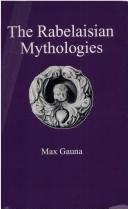Check nearby libraries
Buy this book

Author Max Gauna has contributed to Rabelaisian studies an analysis of the author's four authentic novels, considered in the light of his own description of them as mythologies.
In the preface, Gauna remarks that such an enterprise requires attention to meaning and recognizes that meaning itself is called into question by much of postmodernist criticism, especially deconstruction. He also observes that deconstruction impinges on Rabelaisian criticism with particular force insofar as it may be seen to derive from the doctrines of the classical sophists as they are depicted in the Platonic dialogues, which themselves are an inspiration for author Rabelais.
In the introduction, Gauna relates the question of critical ideology to the age-old philosophical dialectic of the One and the Many. He shows how Rabelais's work exemplifies the tensions of that dialectic in a highly significant way, in that the multiform exuberance of the writing may be seen to play against its philosophical tenor, which espouses wholeheartedly the cause of the One against the Many.
He then considers the question of mythology and suggests that Rabelais's stories may properly be seen as philosophical rhetoric, or the logotherapy of a committed Platonic doctor. He attends lastly to the question of laughter.
Gauna then devotes a chapter to each of the Rabelaisian chronicles, considered as mythology. An outline of all significant sections is provided, but where existing interpretations seem satisfactory, the reader is simply referred to the relevant critical literature. Thus, while chapters 1 and 2 are relatively shorter insofar as the philosophical content of the first book is episodic and that of the second largely clear-cut, new exegeses of certain sections of both are adumbrated.
Chapter 3 suggests a new reading of the third book as a whole, in which Rabelais is seen to draw inspiration from the doctrines of Plato and the battle of Socrates with the sophists, incorporating into his worldview the central role of divination and the good demons who mediate between God and man.
Chapter 4 examines in detail the various myths of the fourth book and suggests that in it Rabelais propounds a radically unorthodox syncretism in which the poetic attractions of Platonic and Plutarchan demonology are preponderant, in which Christ Himself may be seen as the greatest of the demons, and where the climax of the book shows us the hero Pantagruel in direct communication with his own guardian demon.
A short epilogue sums up Gauna's conclusions and suggests reasons for the literary and philosophical attractions of magical Platonism.
Check nearby libraries
Buy this book

Previews available in: English
| Edition | Availability |
|---|---|
|
1
The Rabelaisian mythologies
1996, Fairleigh Dickinson University Press, Associated University Presses
in English
0838636314 9780838636312
|
aaaa
Libraries near you:
WorldCat
|
Book Details
Edition Notes
Includes bibliographical references (p. 279-285) and index.
Classifications
The Physical Object
ID Numbers
Community Reviews (0)
Feedback?| July 29, 2024 | Edited by MARC Bot | import existing book |
| October 17, 2022 | Edited by ImportBot | import existing book |
| April 28, 2010 | Edited by Open Library Bot | Linked existing covers to the work. |
| February 11, 2010 | Edited by WorkBot | add more information to works |
| December 10, 2009 | Created by WorkBot | add works page |









